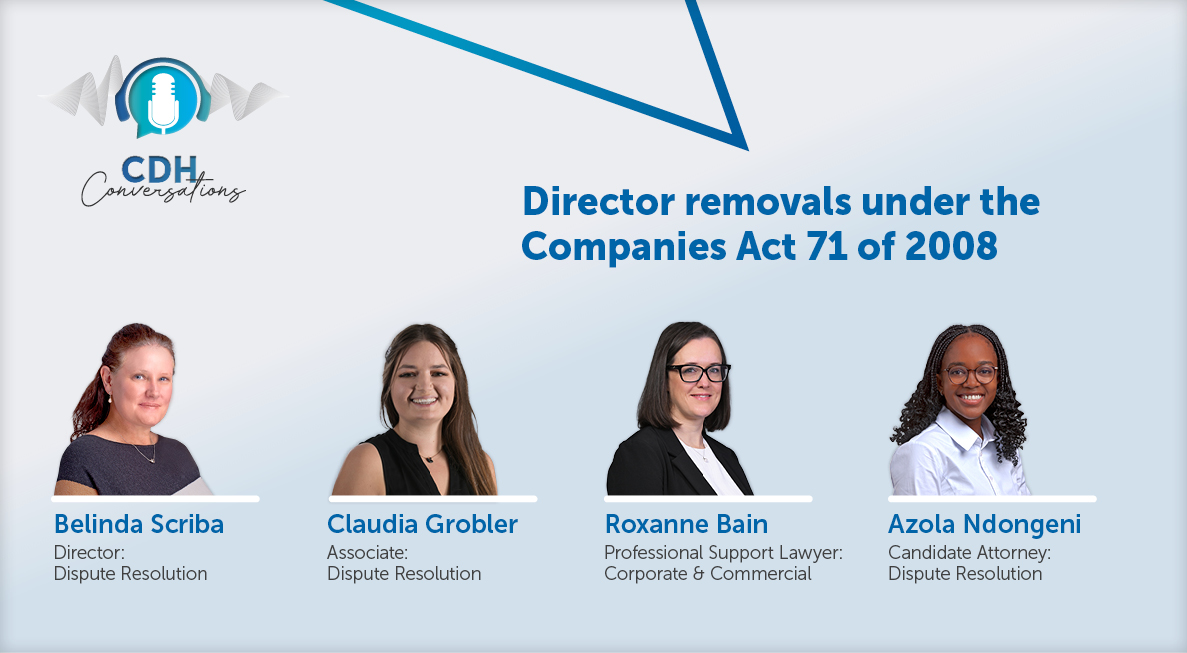MOI trumps shareholder arrangements
At a glance
- One of the foundational principles of the Companies Act 71 of 2008 is that a provision of a shareholders’ agreement that is inconsistent with the memorandum of incorporation (MOI) is void to the extent of such inconsistency.
- A recent judgment of the Western Cape High Court provides important guidance on the enforceability of shareholders’ agreements that conflict with a company’s MOI.
- Ultimately, shareholders’ agreements (however framed) and the MOI need to be negotiated and agreed as a single consistent package.
One of the foundational principles of the Companies Act 71 of 2008 (Companies Act) (and one which is frequently missed or misunderstood by shareholders) is set out in section 15(7) – a provision of a shareholders’ agreement that is inconsistent with the memorandum of incorporation (MOI) is void to the extent of such inconsistency.
A recent judgment of the Western Cape High Court (South African Renewable Green Energy (Pty) Ltd and Others v Coria (PKF) Investments 28 (RF) (Pty) Ltd and Others (6020/2023; 16391/2023) [2025] ZAWCHC 458 (9 October 2025)) affirms this principle and addresses the interplay between a company’s MOI, shareholders’ agreements, and related voting rights arrangements. The case provides important guidance on the enforceability of shareholders’ agreements that conflict with a company’s MOI, the enforceability of agreements to make future amendments to constitutional documents, and the limits of retrospective validation.
Facts
The dispute followed a complicated restructure of a private company operating in the renewable energy market and its shareholding. The transaction was implemented through a suite of agreements, including a shareholders’ agreement and a voting rights agreement providing for directors to have weighted voting rights. That is, the shareholders agreed that the directors should not have one vote on each matter, but rather each director would have a number of votes determined by reference to the shareholding of the shareholder who nominated that director. Not all of the shareholders were party to the voting rights agreement.
The agreements sought to allocate board representation and voting rights among the various stakeholders, with particular focus on the control of the company through a family-held entity, accommodating board representation for funders, and aligning with Department of Energy and lender requirements. Crucially, however, the MOI had not been updated to reflect the weighted voting rights which the agreements purported to confer on the directors (for commercial and timing reasons).
The agreements included a commonly used provision to the effect that the shareholders are obliged to amend their agreement in the event that there is an inconsistency with the MOI to remove that inconsistency – a fallback position designed to attempt to give effect to the agreed intent of the shareholders if an inconsistency did arise.
For our purposes, the core issues before the court were:
- whether the conflicting provisions regarding directors’ voting rights in the agreements and the MOI rendered the relevant provisions void under section 15(7) of the Companies Act;
- whether the fact that the relevant agreement was between some, but not all, shareholders affected the interpretation;
- whether a subsequent amendment of the MOI to align with a previously conflicting provision could retrospectively validate that provision; and
- the extent to which an agreement obliging the shareholders to amend the MOI to align it with the shareholders’ agreement would be enforceable.
The court held that, in terms of section 15(7) of the Companies Act, the provision which sought to weight the directors’ voting rights in conflict with the provisions of the MOI was void and unenforceable. The court rejected arguments that such a provision could be retrospectively validated by a later amendment to the MOI, emphasising that a void provision cannot be revived ex post facto.
The court also noted that even if an agreement is between some, and not all, shareholders, its provisions should still comply with the Companies Act and are therefore required to be consistent with the MOI.
The court declined to order the parties to take steps to amend the MOI to reflect the weighted voting regime, noting that such an amendment would require consequential amendments and a comprehensive alignment of the MOI with the shareholders’ agreement, as well as the consent of third parties. The court emphasised that piecemeal amendment would not resolve the broader governance issues and that further negotiation among the parties was required. A guiding principle of South African contractual law remains that a court will not make an agreement for the parties.
Practical considerations
It should be borne in mind that section 15(7) should be interpreted narrowly, and only in situations where there is direct and irreconcilable conflict between the MOI and a shareholders’ agreement (Gihwala and Others v Grancy Property Ltd and Others 2017 (2) SA 337 (SCA)). However, the Coria case illustrates the risks where a conflict arises. The primacy of the MOI in our companies law means that shareholders need to be cognizant that, however clearly they agree amongst themselves on provisions, the act may override that agreement. Ultimately, shareholders’ agreements (however framed) and the MOI need to be negotiated and agreed as a single consistent package.
It is also not enough to rely on a fallback undertaking to amend a way out of the problem: where there is a conflict between the MOI and a shareholders’ agreement, courts (as in this case) may well be reluctant to order amendments to the MOI, given the complexities surrounding such variations. A practical fallback that might be considered could be the incorporation of a deadlock mechanism whereby the MOI or shareholders’ agreement stipulates that an independent third-party expert be appointed to resolve any such inconsistencies, with that expert’s determination then being binding on the parties.
In conclusion, this judgment underscores the dominance of the MOI in corporate governance and the limitations on the enforceability of shareholder agreements that conflict with it. The case highlights the importance of ensuring alignment with constitutional documents and the need for comprehensive, rather than piecemeal, amendments when resolving governance or commercial difficulties that arise. Parties to complex funding and shareholder arrangements should take care to ensure that all agreements are consistent with the MOI and the Companies Act to avoid similar disputes.
The information and material published on this website is provided for general purposes only and does not constitute legal advice. We make every effort to ensure that the content is updated regularly and to offer the most current and accurate information. Please consult one of our lawyers on any specific legal problem or matter. We accept no responsibility for any loss or damage, whether direct or consequential, which may arise from reliance on the information contained in these pages. Please refer to our full terms and conditions. Copyright © 2026 Cliffe Dekker Hofmeyr. All rights reserved. For permission to reproduce an article or publication, please contact us cliffedekkerhofmeyr@cdhlegal.com.
Subscribe
We support our clients’ strategic and operational needs by offering innovative, integrated and high quality thought leadership. To stay up to date on the latest legal developments that may potentially impact your business, subscribe to our alerts, seminar and webinar invitations.
Subscribe




